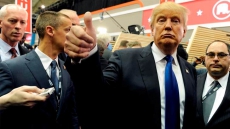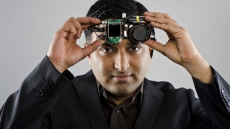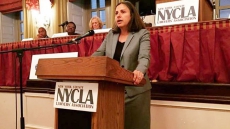OTTAWA — Is Justin Trudeau laying the groundwork for reneging on his promise to make the 2015 federal election the last to be conducted under the first-past-the-post voting system?
Or is the prime minister trying to drive a hard bargain with the NDP and Greens to abandon their own ambitious preferences and accept instead a more modest change to a ranked ballot system?
Those questions have been touched off by an interview Trudeau gave to Montreal's Le Devoir newspaper.
In it, Trudeau says major reforms would require "substantial" support, and yet the public clamour for change seems to have diminished since he led the Liberals to election victory one year ago.

NDP Leader Tom Mulcair sees the remarks as clear evidence that Trudeau is preparing to break his promise on electoral reform.
But the prime minister also says in the interview that less dramatic changes to the voting system — which could apply to ranked balloting — wouldn't need the same high level of support.
FIVE THINGS TO KNOW ABOUT JUSTIN TRUDEAU ONE YEAR AFTER LIBERAL ELECTION WIN
Canadians have no doubt learned a lot about Justin Trudeau in the year since he was elected prime minister. Here are five examples:
1. He plays his cards close to his chest. Before and during the election campaign, Trudeau would let you know where he stood on issues. Marijuana? Legalize it.

Deficits? Down with it. Raise taxes on the top earners? Of course. But since coming to office, he has kept particular views to himself. On the specifics of building pipelines and electoral reform, for example, Trudeau doesn't say what projects or voting system he backs.
When asked about pipelines, Trudeau talks about the economy and environment going hand in hand, the need for social license and to work with aboriginal communities. "He's a waffler in the grand Liberal tradition," says Nelson Wiseman, director of the Canadian Studies Program at the University of Toronto. Trudeau likely has about two years at the most to push one or two major issues before he heads into re-election mode. He has spent the past year watching his polling numbers stay high and building political capital. What will he spend it on?

2. He's a different leader than his father. The opposition like to razz Trudeau about taking too many selfies and not focusing on the issues of the day. No one believes Trudeau isn't authentic when he poses for pictures or shakes hands with domestic and international crowds, even though his staff works hard to make sure he can get a picture with anyone who wants one. Trudeau is more social than many anticipated, Wiseman says, including letting people connect with him through his family.
Trudeau's public image is opposite in many ways to that of his father, Pierre Elliott Trudeau, who Wiseman describes as aloof and calculating: "You can't imagine the younger Trudeau say, 'Just watch me.'" The current prime minister conveys a sense of passion for the country that seems sincere, says Max Cameron, director of Centre for the Study of Democratic Institutions at the University of British Columbia: "That's gold."

3. His campaign performance in 2015 was no accident. Penny Collenette, a former official in the Prime Minister's Office during Jean Chretien's tenure, says it's almost as if Trudeau is still in campaign mode a year after the election.
"He clearly gets his energy from people and frankly, it will probably serve him well in this mandate," Collenette says. "Perhaps his true governing style will not become apparent until budget decisions have to be made." Cameron agrees, saying Canadians are likely to learn more about Trudeau's specific positions on issues during the second year of his mandate.

4. He's no micromanager. Andrew Potter, director of the McGill Institute for the Study of Canada and the former editor-in-chief of the Ottawa Citizen newspaper, says some in politics like to wallow in the fine details (See: Stephen Harper), while others govern from 30,000 feet. "Trudeau seems oddly disengaged to me," says Potter.
Some decisions have caught people pleasantly by surprise, such as having gender parity in cabinet. But that's not what has people confused. Trudeau seems keen on being a global political leader and basking in the international spotlight — something Canadians like because we tend to have an inferiority complex on the global stage, Wiseman says. The issue is what Trudeau does when he returns home. "It's not clear to me what he's actually doing ... on a day-to-day job of governing," says Potter.

5. Sunny ways notwithstanding, he can still play the villain. At its core, governing is about making tough choices and trade-offs, says Cameron: Getting aboriginal buy-in for pipeline projects and needing to get oil to tidewater, for example.
Trudeau has shown an ability to wear a black hat when the situation demands it, such as his unilateral plan for a price on carbon, or taking a hard line on health care funding. In both cases, Trudeau took a position sure to be unpopular with the premiers, despite having vowed to work with them, Cameron says. Indeed, he's adopted more conservative policies on health care funding and greenhouse gas emission targets, says Potter — evidence that Trudeau understands sunny ways might be a great strategy to get elected, but a terrible strategy to govern.




